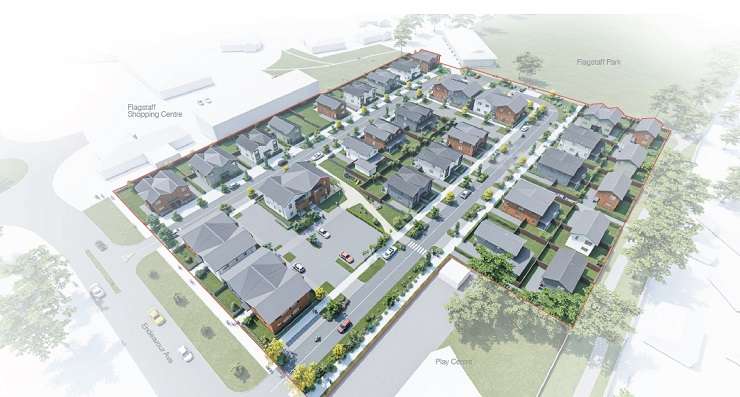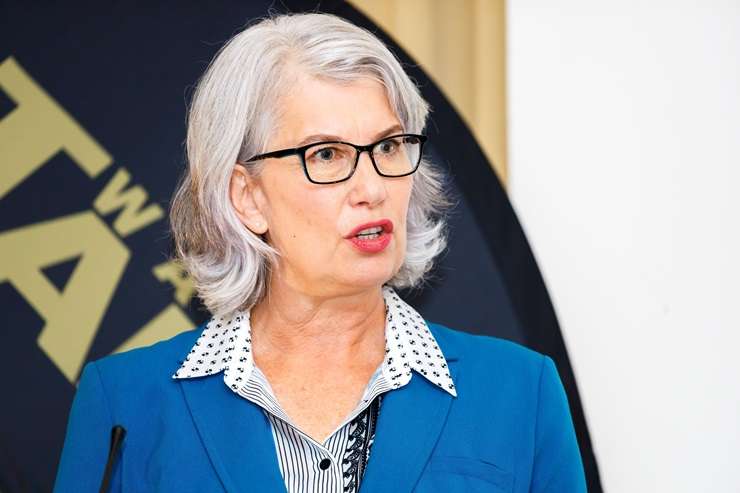A controversial state housing development in North Hamilton has been delayed and could even be scrapped as Kāinga Ora comes up with a new plan for social housing around the country.
Hamilton’s mayor Paula Southgate has “mixed feelings” about the large development on Endeavour Avenue, in Flagstaff, being placed on hold, saying she understands why the local community might be relieved by the decision, but warns that the city is still facing a serious housing shortage.
The 60-house housing project, in Flagstaff and a 49-house development on Ōhaupō Road and Collins Road, in Melville, both in Hamilton, are among thousands of consented but not contracted houses under review while Kāinga Ora worked with the Ministry of Housing and Urban Development on its strategies and priorities. Contracted developments would continue as planned.
As of 31 May, there were 3001 consented but not contracted houses including 833 due to be delivered by June 2025. Kāinga Ora general manager of construction and innovation Patrick Dougherty said a number of these projects would go ahead once it confirmed value for money and alignment with the Ministry of Housing and Urban Development (MHUD) priority locations through its reassessment process.
Start your property search
While the remaining 2,168 consented but not yet contracted houses planned for delivery after 30 June 2025 were paused as part of the organisational review, he said.
A full list of the large social housing developments around the country now on hold could not be provided without it being treated as an Official Information Act request.
Discover more:
- Real estate patriarch sells own home for $1.32m in drama-filled auction
- Catholic Church buys landmark Auckland wine estate - but did it pay the $7.5m asking price?
- Tux Wonder Dogs’ Mark Leishman selling country home following deaths of beloved Labradors
However Kāinga Ora regional director Mark Rawson confirmed the largest social developments planned for Hamilton had been impacted. “Te Mauri Pahere ki Mangakootukutuku [Melville] and the 60-home Endeavour Avenue development are currently paused while we work with the Ministry of Housing and Urban Development on our asset management strategy, including understanding priorities and financing for our housing renewal programme."

The Flagstaff development is to be a mix of social and private housing. Photo / Supplied
The Endeavour Avenue development was first revealed in 2020 and met with strong community opposition around the size and scale of the design and concerns around increased traffic and crime.
As a result of the community's resistance, Kāinga Ora scaled back its plans from a three-storey development with 70 houses to a two-storey development with 60 houses. The final design consisted of 19 two-bedroom homes, 32 three-bedroom homes, eight four-bedroom homes and one five-bedroom home - some of which would be publicly owned.
The current delay is the latest in a series of events from staff shortages due to Covid-19 to bad weather affecting the housing development. Work on the build was originally expected to begin 2021, then 2023 and - before the brakes were recently slammed on it - even the second half of 2024.
Southgate told OneRoof Kāinga Ora had not directly notified her about the Endeavour Ave or Melville housing developments, which had been in the pipeline for many years.
Southgate believed Flagstaff residents would be “breathing a sigh of relief because they never really welcomed that scale and type of development”.

Hamilton mayor Paula Southgate: “We are still in the situation that we have been in for some time – Hamiltonians need houses and they are just not there." Photo / Supplied
Even at the time of the proposal, Southgate went into bat for the community and – albeit unsuccessfully - urged Kāinga Ora to carry out a publicly notified resource consent for the build.
However, she said with at least two large social housing developments on hold, the city was short of affordable, community, emergency or even rental housing stock.
“I have mixed views on it. I understand a sigh of relief in the community, but I also feel like, 'goodness, when are we ever going to make credible inroads into this housing situation?'” she said.
“So we are still in the situation that we have been in for some time – which is Hamiltonians of all budgets and all situations need houses and they are just not there...."
If the two large developments on hold didn't go ahead, then about 100 fewer houses would be available for Hamilton people who needed them.
"If we don’t get them, are people in emergency housing in motels longer or is there another alternative?”
Southgate said the 1.9ha site was zoned for residential housing so regardless of whether Kāinga Ora continued to own it or someone else did, it would likely have houses built on it.
“Wherever there is an opportunity to build a mix typology of housing – some affordable, some slightly more expensive, some rental – I'm all for it because that’s what people need.”
Southgate also supported the revitalisation of other areas where there was existing state housing.
There were currently more than 40 social housing developments under construction in Hamilton on both new and existing sites, according to Kāinga Ora’s website, ranging from small four-house developments to a 33-house development on Killarney Road, in Frankton due to be completed early next year.
Whangarei mayor Vince Cocurullo was also unaware that 50 proposed homes on Tiki Place, Tamingi Street and Peter Snell Road in Ruakaka were also on hold.
Kāinga Ora was in the process of getting resource consents for the project, but a spokesperson confirmed all other work had been paused.
Cocurullo said as a council it always supported the building of new homes. Kāinga Ora confirmed large social housing development on Kauika Road in Whangārei was well underway and stage one of the 95-home development was expected to be completed by June 2025.
Planning for a new large housing development on 3ha of bare land on Ōwhata Road in Rotorua, aimed at providing 93 social, affordable and market housing, was also stopped while Kāinga worked with the Ministry of Housing and Urban Development on the priorities and future financing for urban development.
The big changes come on the back of a critical review of Kainga Ora led by Sir Bill English that found the country’s biggest landlord was underperforming, not financially viable and the governance from the board lacking.
A new chairman, ex-Spark boss Simon Moutter, was appointed in May to come up with a more financially sustainable plan for the organisation and to ensure its core focus was predominantly on being a landlord.
Moutter announced this week that Kāinga Ora chief executive Andrew McKenzie would be standing down from the role at the end of October after eight years due to the role being vastly different from what he signed up for. He would also collect a $365,500 payout, which equated to six months of his base salary.
- Click here to find properties for sale















































































